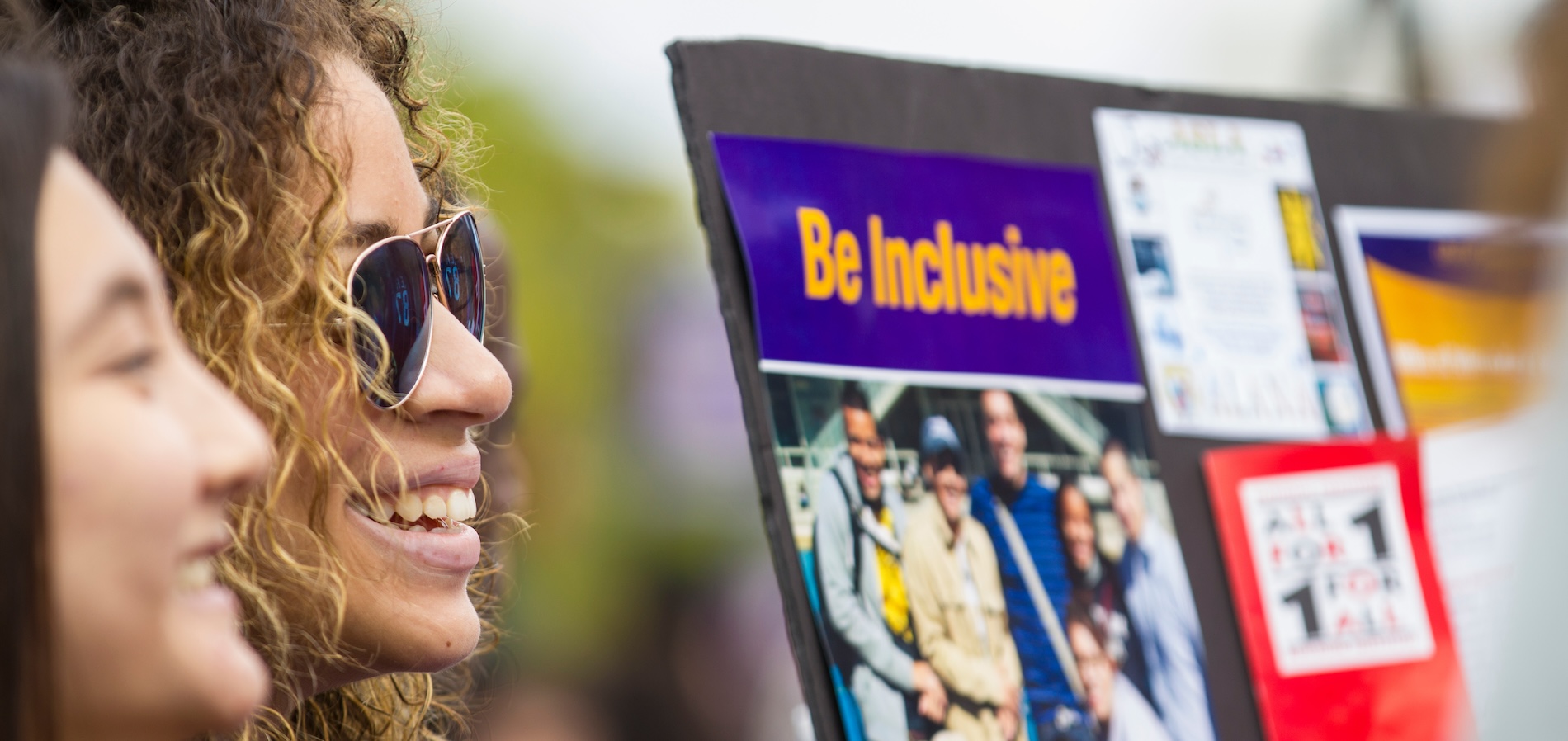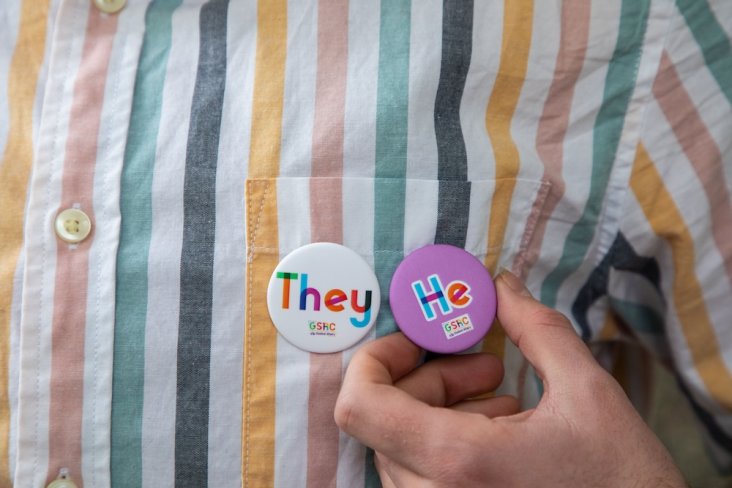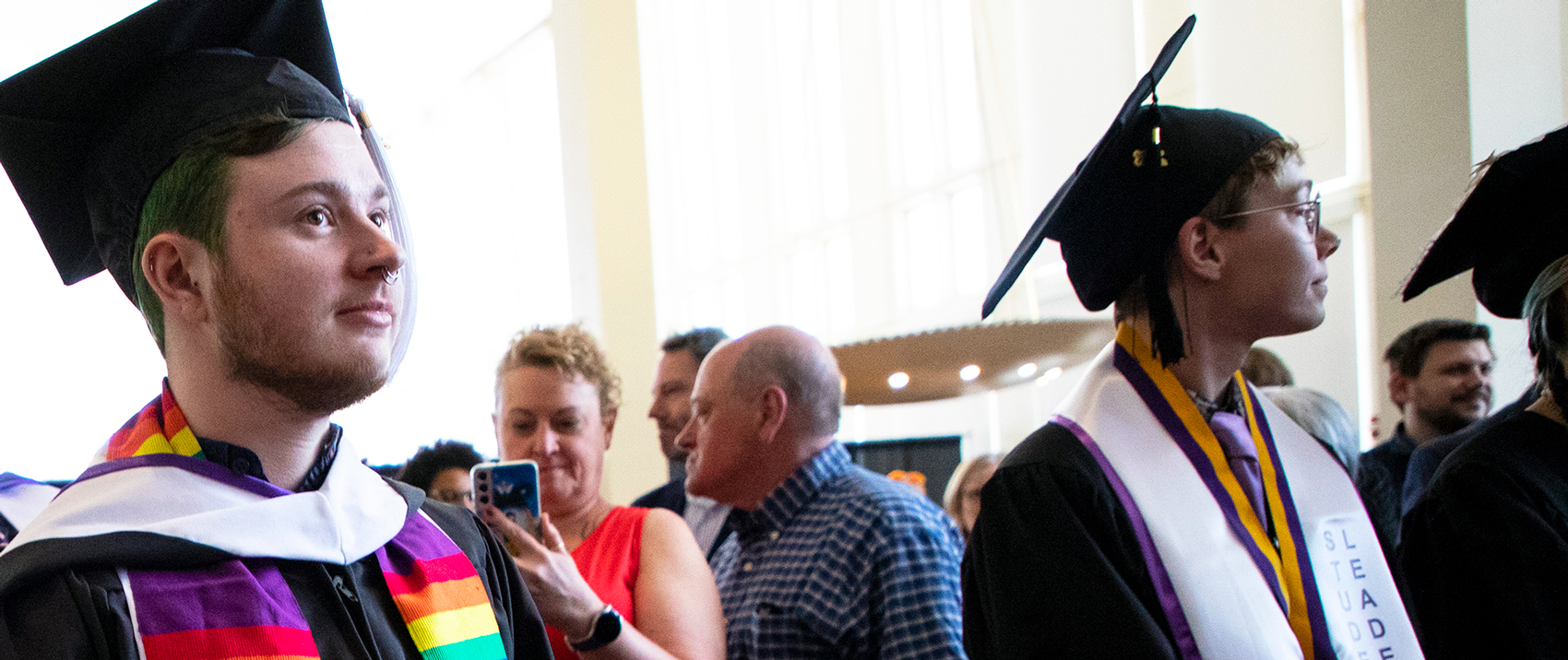"We've had great accomplishments. Just being able to recognize and celebrate that is activism in itself."
- Phoenix Hernandez

UAlbany is recognized as a model campus for LGBTQ+ events, programs, support and services.
The Gender and Sexuality Resource Center (GSRC) serves as a hub for community, pride and empowerment. We are all navigating the world, along with social media, filled with competing expectations and messages around gender and its relationship to sexuality. At the GSRC you will find a comfortable and inspiring environment for social events and discussions filled with programs and events that serve to accelerator your understanding of your place in the world and connection to others.
Through expert consultation and co-sponsorship, GSRC Connections Peer Educators create engaging spaces for student and group collaboration. Our campus-wide events are part of the fabric of campus life.

Choose roommates from across the gender spectrum, join Harvey House or opt for single-gender housing that aligns with your gender identity.

Gender and sexuality social and advocacy groups host events across campus to cultivate a strong sense of community.

Check out events on our social media, follow us on Instagram and stay in the know with our weekly newsletter.
"We've had great accomplishments. Just being able to recognize and celebrate that is activism in itself."
- Phoenix Hernandez
The GSRC offers opportunities for you to engage and grow on campus. In addition to weekly events and programming led by our GSRC Peer Educators, we can also connect you with:
Scholarships
Student volunteers with the GSRC are eligible for the Rob and Scott Sinclair Scholarship for rising Sophomores. Check our MyInvolvement page for annual applications and eligibility. See our Awards and Recognitions page for more ISE scholarships.
Gender Inclusive and Trans Resources
View our regularly updated Trans Resource Guide for an overview of campus resources. This guide outlines how to use your chosen name on campus, gender inclusive or LGBTQ+ specific housing options, as well as tips on campus and local healthcare. You can reach out to the GSRC to work with our Trans Outreach peer navigator for any additional needs or questions. In addition, see our map of gender inclusive facilities on campus.
Urgent and Emergent Funds
Thanks to support from alumni and the campus community, the GSRC is able to provide some support for LGBTQ+ students navigating urgent, unforeseen financial needs on a case-by-case basis. For students concerned about longer term housing insecurity, food insecurity or in need of emergency support, additional resources are offered through the Dean of Students Office Supplemental Services.
Internships for Course Credit
The GSRC is a registered organization with UAlbany’s Community & Public Services Program (CPSP) and many departmental specific internships for course credit. Through these programs, you can complete 60 to 100 hours of service with the GSRC and receive one to three credits per semester for a maximum of four semesters.
Student Organization Collaboration
Our center has many supplies, technology and great social spaces for group collaboration. Reach out to our staff to collaborate on a program or host your e-board meeting or other events in our space.
Lavender Celebration & Awards
Lavender Celebration recognizes LGBTQ+ and allied students completing their bachelor’s, master’s or PhD degree during Commencement week. This celebration features alumni speakers and an awards ceremony. For more information on this and other ISE celebration events visit Awards and Recognitions.
General Campus Diversity & Inclusion Resources
UAlbany has a standing LGBTQ+ Advisory Council that continues to work across our campus community on issues affecting LGBTQ+ students, faculty and staff. You can find more information on UAlbany’s commitment to diversity and inclusion, anti-discrimination policies and bias incident response by visit the Division of Inclusive Excellence website.
GSRC Peer Educators host weekly programming including our signature late night Fridays on the first Friday of each month. In addition to these events, we partner with departments across campus to host speakers and programs on awareness days spanning the LGBTQ+ acronym including LGBTQ+ History Month, Trans Awareness Month, QTPOC Socials, Chosen Family Dinner, Trans Day of Visibility and more. See our ISE Toolkits and Resource Guides for ways to engage with these and many more awareness events.
View our ISE Toolkits and Resource Guides for materials designed by our peer educators and updated by our student organizations with ways to celebrate identity and engage with awareness events on your own or with our centers.

The University at Albany earned 5 out of 5 stars from Campus Pride Index, a national assessment guide to help students find universities and colleges that create safer, more inclusive campus communities for LGBTQ+ people. UAlbany is the first SUNY campus to achieve a 5-star rating from the index.
One example of UAlbany’s commitment to diversity and inclusion is Intersections, an Orientation workshop for new students stressing the importance of social justice, diversity, equity and inclusion. The workshop is led by UAlbany students trained as peer educators.

1400 Washington Avenue
Albany, NY 12222
United States